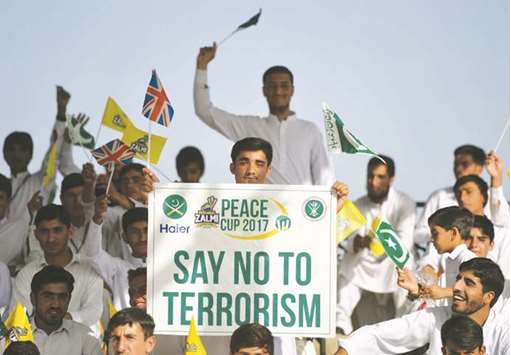The Milli Muslim League party loyal to Hafiz Saeed — who the United States and India accuse of masterminding the 2008 Mumbai attacks that killed 166 people — won 5% of the votes in the contest for the seat vacated when prime minister Nawaz Sharif was removed from office by the Supreme Court in July.
But the foray into politics by Saeed’s Islamist charity appears to be following a blueprint that Sharif himself rejected when the military proposed it in 2016, according to three government officials and a retired former general briefed on the discussions.
None of the sources interviewed for this article could say for sure if the MML’s founding was the direct result of the military’s plan, which was not discussed in meetings after Sharif put it on ice last year.
The MML denies its political ambitions were engineered by the military.
The official army spokesman did not comment after queries were sent to his office about the mainstreaming plan and what happened to it.
Three government officials and close Sharif confidants with knowledge of the discussions said the military’s powerful Inter-Services Intelligence agency (ISI) presented proposals for “mainstreaming” some militant groups in a meeting last year.
They said that Sharif had opposed the “mainstreaming” plan, which senior military figures and some analysts see as a way of steering ultra-religious groups away from violent militancy.
“We have to separate those elements who are peaceful from the elements who are picking up weapons,” said retired Lieutenant General Amjad Shuaib, adding that such groups should be “helped out to create a political structure” to come into the mainstream.
The plan — which Shuaib told Reuters was shared with him by the then-head of the ISI — said those who were willing “should be encouraged to come into the mainstream politics of the country”.
He added that in his capacity as a retired senior military officer he unofficially spoke to Hafiz Saaed and another alleged militant about the plan, and they were receptive.
Shuaib later said his comments in the interview were taken out of context and were part of a broader discussion about deradicalisation strategies.
Writing in a local newspaper on Wednesday, he said the report “maliciously attributed some statements to me totally out of context, just to suit its own narrative”.
A spokesperson for Reuters said: “We stand by our reporting.”
Saeed’s religious charity launched the Milli Muslim League party within two weeks of the court ousting Sharif over corruption allegations.
Yaqoob Sheikh, the Lahore candidate for Milli Muslim League, stood as an independent after the Electoral Commission said the party was not yet legally registered.
But Saeed’s lieutenants, JUD workers and MML officials ran his campaign and portraits of Saeed adorn every poster promoting Sheikh, who came in fourth place on Sunday with Sharif’s wife taking the seat as expected.
Analyst Khaled Ahmed, who has researched Saeed’s Jamaat-ud-Dawa charity and its connections to the military, says the new political party is clearly an attempt by the generals to pursue an alternative to dismantling its militant proxies.
“One thing is the army wants these guys to survive,” Ahmed said.
“The other thing is that they want to also balance the politicians who are more and more inclined to normalise relations with India.”
Saeed has been under house arrest since January at his house in the eastern city of Lahore.
In recent weeks several senior figures from the ruling PML-N party have publicly implied that elements of the military — which has run Pakistan for almost half its modern history and previously ousted Sharif in a 1999 coup — had a hand in the court ouster of Sharif, a charge both the army and the court reject.
A representative of the PML-N, which last month replaced him as prime minister with close ally Shahid Khaqi Abbasi, said the party was “not aware” of any mainstreaming plan being brought to the table.

